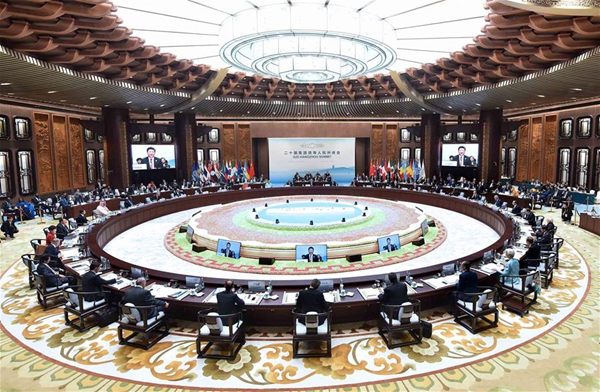The Hangzhou G20 summit: key takeaways from Xi's standout speech
- By Niranjan Sahoo
 0 Comment(s)
0 Comment(s) Print
Print E-mail China.org.cn, September 11, 2016
E-mail China.org.cn, September 11, 2016
|
|
|
Chinese President Xi Jinping presides over the opening ceremony of the Group of 20 (G20) summit in Hangzhou, capital of east China's Zhejiang Province, Sept. 4, 2016. (Xinhua/Li Tao) |
Hangzhou has done a great job of enhancing the stature and relevance of the G20. Notwithstanding the outsize attention paid by the Western press to the diplomatic fiasco over the American president's arrival in the host city, the Hangzhou summit can claim to have built a broad consensus on several key issues concerning the global financial crisis, globalization, trade protectionism, Brexit, sustainable development and inclusive growth. There is not another G20 meeting where the host country held such a wide range of dialogues.
The highpoint of the summit was Xi's passionate speech that deftly captured the growing tension and uncertainty besetting the global economic and political systems while providing a long-term vision and realistic roadmap for "creating a new path for growth" across the world.
The speech that took a broad swap at diverse issues ranging from climate change, Brexit, globalization, growth and inclusive development, urged world leaders to shun the path of protectionism and embrace an innovative and all inclusive agenda.
Xi's speech, which took a tight rope walk between the challenges of geo-economics and geopolitics, can take credit for building bridges on the G20's priority areas, such as policy coordination, devising a new growth model based on innovation, creation of more effective and efficient global economic and financial governance, inclusive and interconnected development and reinvigoration of globalization.
The speech will surely resonate for long time and may foster genuine cooperation among leading nations to address the many challenges surrounding current global governance.
While Xi's opening address will surely go down as a G20 classic for its painstaking attention to find lasting solutions for global governance, three issues stand out. First, Xi's opening address was marked by its candour and honest acknowledgement of the benefits of globalization by "reforms and opening up" in making China an economic powerhouse and aiding an unprecedented 700 million Chinese population to escape poverty. Therefore it is not surprising that Xi's speech made a strong pitch for G20 leaders to continue promoting trade openness and building a fairer and more equitable international order.
Second, Xi's speech was seminal for its bold attempt to bring inclusive development to the center stage of most important club of the world. The G20 Communiqué and Xi's closing speech clearly confirm that G20 nations have agreed to such a lofty goal. The initiation of two major proposals - the G20 Initiative on Supporting Industrialization in Africa and Least Developed Countries and the Global Infrastructure Connectivity Alliance Initiative (featuring the Belt and Road initiative) - easily establish serious intent. These are significant milestones to address the developmental needs of huge impoverished populations in the Global South. This speaks a volume about the inclusive agenda (Hangzhou Consensus) of the host and the consensus that the G20 nations promptly agreed to. China has been able to institutionalize the same among G20 nations. In Xi's own words "We hope to convey a message to the international community that the G20 works for the interest of not just its 20 members, but the whole world. We will work to ensure that growth and development benefit all countries and peoples and that the livelihood of all people, especially those in developing countries, will get better day by day."
The third issue that stands out is Xi's non-confrontational and cooperative approach to building bridges across regions and state actors of different persuasions. While addressing the apprehensions of some countries over the establishment of the Asian Infrastructure Investment Bank as a counter measure against the Western-backed World Bank and International Monetary Fund, Xi made it amply clear that "new mechanisms and initiatives launched by China are not intended to reinvent the wheels or target any other country. Rather, they aim to complement and improve the current international mechanisms to achieve win-win cooperation and common development. China's opening drive is not a one-man show." In other words, China does not wish to create another Cold War. It desires to create a win-win situation for the entire world.
Niranjan Sahoo is Senior Fellow, Observer Research Foundation, New Delhi.
Opinion articles reflect the views of their authors, not necessarily those of China.org.cn.







Go to Forum >>0 Comment(s)